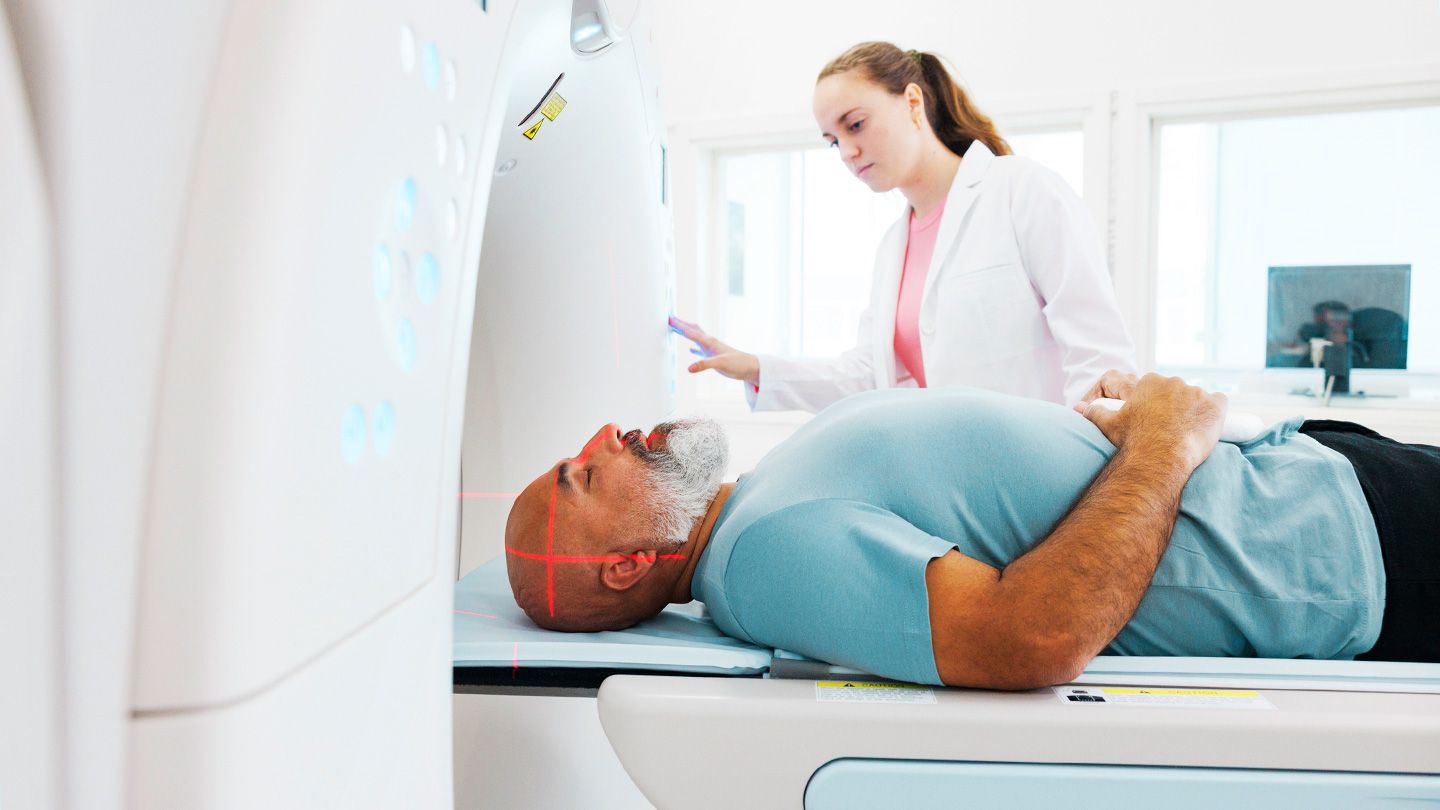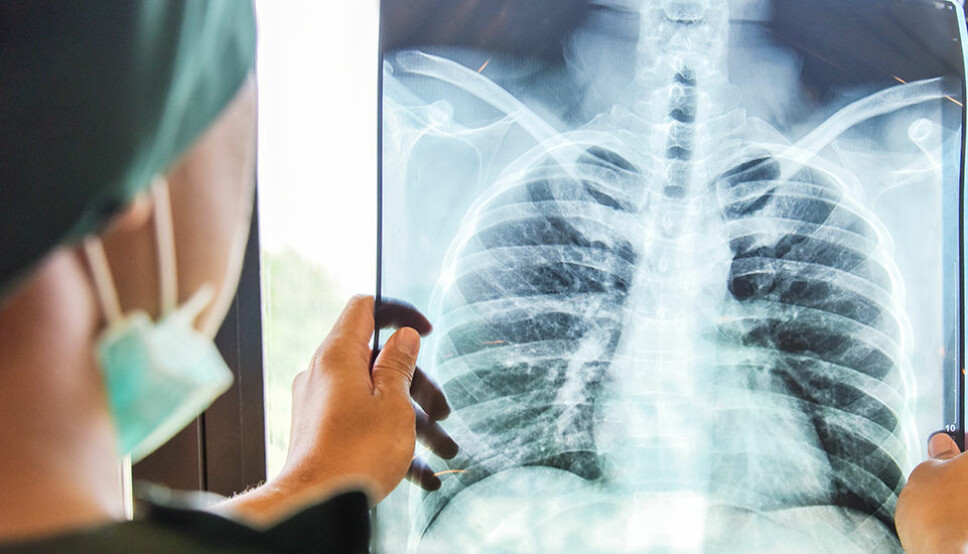Lung Cancer Screening
Lung cancer is a severe and often fatal disease affecting millions worldwide. It is a type of cancer that begins in the cells of the lungs and can spread to other parts of the body. Early detection and treatment of lung cancer can significantly improve outcomes and increase the chances of survival.
This is why regular lung cancer screenings are so important, especially for those at high risk of developing the disease. CoreMed Plus is a leading healthcare provider that offers comprehensive lung cancer screening services to help patients identify and manage their risk for lung cancer.
Through our state-of-the-art screening program, we use advanced imaging techniques such as low-dose CT scans to detect early signs of lung cancer. Our experienced medical team works closely with patients to develop personalized screening plans based on their risk factors, medical history, and overall health. We also offer various support services and resources to help patients navigate the screening process and access the necessary care.
At CoreMed Plus, we are committed to providing our patients with the highest quality of care, and our lung cancer screening program is no exception. We use the latest technology and medical expertise to ensure accurate and reliable results, and our compassionate staff is dedicated to helping patients through every step of their screening journey. With our comprehensive lung cancer screening services, patients can have peace of mind knowing that their health is in good hands.

What is Lung Cancer
Lung cancer is a disease that occurs when lung cells grow uncontrollably, forming a mass or tumor. This tumor can interfere with the lung’s ability to function correctly, leading to various symptoms and complications. Lung cancer is one of the most common types of cancer worldwide and is a leading cause of cancer-related deaths.
There are two main types of lung cancer: non-small cell lung cancer (NSCLC) and small cell lung cancer (SCLC). NSCLC is the most common type, accounting for about 85% of all lung cancers. SCLC is less common but tends to grow and spread more quickly than NSCLC.
Most cases of lung cancer are caused by smoking cigarettes, but exposure to other harmful substances like radon, asbestos, and pollution can also increase the risk. A family history of lung cancer or certain genetic mutations can also increase a person’s risk of developing the disease.
Symptoms of lung cancer can vary depending on the stage and location of the tumor. Some common symptoms include:
- Persistent cough that worsens over time
- Chest pain
- Shortness of breath
- Wheezing or hoarseness
- Coughing up blood or rust-colored sputum
- Fatigue or weakness
- Unintentional weight loss
Many of these symptoms can be caused by other respiratory conditions or illnesses, so it is important to consult a healthcare professional if you experience any persistent or concerning symptoms.
Diagnosis of lung cancer typically involves imaging tests such as chest X-rays, CT scans, and PET scans, which can detect the presence of a tumor in the lungs. A biopsy, where a small tissue sample is taken from the tumor and examined under a microscope, is also used to confirm a lung cancer diagnosis.
Treatment for lung cancer depends on the type and stage of the cancer, as well as the patient’s overall health. Common treatments include:
- Surgery to remove the tumor and surrounding tissue
- Radiation therapy, which uses high-energy radiation to kill cancer cells
- Chemotherapy, which uses drugs to kill cancer cells
- Targeted therapy, which uses drugs that specifically target the genetic mutations that are driving the cancer cells to grow
Lung cancer can be challenging and complex to manage, but early detection and treatment can improve outcomes and quality of life. Regular screening for lung cancer is recommended for people at high risk, such as current or former smokers. This screening typically involves a low-dose CT scan of the chest.
CoreMed Plus can help with lung cancer screening by providing access to advanced imaging technology and working with healthcare professionals to develop personalized screening plans based on a patient’s risk factors and medical history. With early detection and treatment, lung cancer can be managed effectively, and CoreMed Plus is committed to helping patients achieve optimal health and wellness.
Signs and Symptoms of Lung Cancer
Lung cancer is a type of cancer that develops in the lungs. It can be categorized into two main types: non-small cell lung cancer and small cell lung cancer. Non-small cell lung cancer is the most common type, accounting for around 85% of all cases, while small cell lung cancer is less common but tends to grow and spread more quickly.
The signs and symptoms of lung cancer can vary from person to person and depend on the cancer stage. In the early stages, lung cancer may not cause any noticeable symptoms. As the cancer grows and spreads, the following signs and symptoms may develop:
- Persistent Cough: A cough that doesn’t go away or worsens over time is a common symptom of lung cancer. The cough may be dry or produce phlegm or blood.
- Shortness of Breath: Difficulty breathing or shortness of breath is a common symptom of lung cancer, particularly in the later stages of the disease.
- Chest Pain: Chest pain that is persistent or worsens with deep breathing, coughing, or laughing may be a symptom of lung cancer.
- Hoarseness: A hoarse voice that doesn’t go away may indicate lung cancer, particularly if a cough accompanies it.
- Unexplained Weight Loss: Losing weight without trying is a common symptom of many types of cancer, including lung cancer.
- Fatigue: Feeling tired or weak is a common symptom of lung cancer, particularly as the cancer grows and spreads.
- Loss of Appetite: A loss of appetite or a feeling of fullness after eating small amounts of food may be a symptom of lung cancer.
- Finger Clubbing: In some cases, lung cancer can cause changes in the shape and size of the fingers, known as finger clubbing.
- Wheezing: A whistling or wheezing sound when breathing may be a symptom of lung cancer.
It’s important to note that many of these symptoms can be caused by conditions other than lung cancer. However, if you experience any of these symptoms, particularly if they are persistent or worsen over time, it’s important to see a doctor for an evaluation.
In addition to these symptoms, some people with lung cancer may experience more serious symptoms, such as chest pain, difficulty swallowing, or coughing up blood. These symptoms may indicate that the cancer has spread to other body parts and require prompt medical attention.
It’s important to be aware of lung cancer’s signs and symptoms and seek medical attention if you experience any of them. Early detection and treatment can improve outcomes and increase the chances of successful treatment.

Diagnosing Lung Cancer
Lung cancer is usually diagnosed through physical exams, imaging tests, and biopsies. Diagnosing lung cancer can take several weeks and may involve multiple tests.
The first step in diagnosing lung cancer is usually a physical exam and reviewing the patient’s medical history. The doctor may ask about the patient’s symptoms, such as coughing, chest pain, shortness of breath, and any risk factors for lung cancer, such as smoking history or exposure to certain chemicals or pollutants.
If the doctor suspects lung cancer based on the patient’s symptoms and medical history, they may order imaging tests such as chest X-rays, CT scans, or PET scans. These tests can help identify abnormal masses or nodules in the lungs and any spread of cancer to nearby lymph nodes or other organs.
If imaging tests show an abnormality in the lungs, the next step is usually a biopsy. A biopsy involves taking a small tissue sample from the abnormal area and examining it under a microscope to look for cancer cells.
Several types of biopsies can be used to diagnose lung cancer. A needle biopsy involves inserting a thin needle into the lung through the chest wall to obtain a tissue sample. A bronchoscopy involves inserting a thin, flexible tube with a camera on the end through the mouth or nose and into the lungs to obtain a tissue sample. A mediastinoscopy involves making a small incision in the neck and inserting a tube to examine the area between the lungs and obtain a tissue sample.
In some cases, a biopsy may not be possible or may not provide enough information to make a diagnosis. In these cases, tests such as sputum cytology or a liquid biopsy may be used. Sputum cytology involves examining mucus from the lungs under a microscope to look for cancer cells. A liquid biopsy involves taking a blood sample to look for fragments of tumor DNA or other markers indicating lung cancer.
Once a lung cancer diagnosis has been made, further testing may be done to determine the cancer stage and whether it has spread to other parts of the body. This may involve additional imaging tests such as MRI or bone scans.
In summary, lung cancer diagnosis usually involves a combination of physical exams, imaging tests, and biopsies. Early diagnosis is essential for effective treatment and improved outcomes. If you are experiencing symptoms or have risk factors for lung cancer, it is essential to speak with your healthcare provider about screening and diagnostic options. CoreMed Plus offers screening services and can help you access the necessary care.
Treatment of Lung Cancer
Lung cancer is typically treated with surgery, radiation therapy, chemotherapy, targeted therapy, and immunotherapy. The treatment approach depends on several factors, such as the type and stage of cancer, the patient’s overall health, and the presence of other medical conditions.
Surgery is often the first line of treatment for lung cancer that has not spread beyond the lung. Surgery aims to remove the cancerous tissue and any nearby lymph nodes that may be affected. If the cancer is small and has not spread, the surgeon may be able to remove the affected lobe of the lung (lobectomy). If the cancer is larger or has spread to nearby structures, the surgeon may need to remove the entire lung (pneumonectomy).
Radiation therapy uses high-energy radiation to kill cancer cells. It can be used alone or in combination with other treatments. Radiation therapy may be used before surgery to shrink the tumor or destroy any remaining cancer cells after surgery. In some cases, radiation therapy may be used as the primary treatment for lung cancer.
Chemotherapy is a cancer treatment that uses drugs to kill cancer cells. It can be given intravenously or orally, and is often combined with other treatments. Chemotherapy may be used before surgery to shrink the tumor or destroy any remaining cancer cells after surgery. It can also be used to treat lung cancer that has spread to other parts of the body.
Targeted therapy is a newer type of cancer treatment that targets specific molecules that are involved in the growth and spread of cancer cells. It can be given intravenously or orally. Targeted therapy is often used with chemotherapy or as a stand-alone treatment for advanced lung cancer.
Immunotherapy is a type of cancer treatment that helps the immune system to recognize and attack cancer cells. It can be given intravenously or orally. Immunotherapy is often used with chemotherapy or as a stand-alone treatment for advanced lung cancer.
Palliative care is a type of care that focuses on managing the symptoms and improving the quality of life for people with lung cancer. It can be given at any stage of the disease and is often used in combination with other treatments. Palliative care may include pain management, counseling, and other supportive therapies.
Clinical trials are research studies that test new treatments or combinations of treatments for lung cancer. They may be offered to people with lung cancer who have not responded to standard treatments or those who are not eligible for standard treatments. Clinical trials can provide access to new treatments and may offer a chance for a better outcome.
In summary, the treatment for lung cancer involves a combination of therapies that are tailored to the individual patient’s needs. Surgery, radiation therapy, chemotherapy, targeted therapy, immunotherapy, palliative care, and clinical trials are all options that may be considered. The best approach depends on several factors and should be discussed with a healthcare provider who specializes in lung cancer treatment.

How CoreMed Plus Can Help You With Lung Cancer Screenings
CoreMed Plus is committed to helping individuals detect lung cancer early through regular screenings. Lung cancer is a serious disease that can be difficult to detect in its early stages, as symptoms often do not appear until the disease has advanced. Regular screenings can help detect lung cancer before it can spread, leading to more effective treatment and better outcomes.
CoreMed Plus offers a variety of lung cancer screening options, including low-dose CT scans and chest X-rays. These tests are safe and non-invasive and can be performed quickly and easily in a doctor’s office or imaging center.
Additionally, CoreMed Plus provides support and resources for individuals diagnosed with lung cancer, including access to experienced medical professionals and information about treatment options. CoreMed Plus understands that a lung cancer diagnosis can be overwhelming and is dedicated to helping individuals and their families navigate this challenging time.
CoreMed Plus is dedicated to improving lung cancer detection rates and outcomes through regular screening and early intervention. Individuals can improve their chances of successful treatment and recovery by taking a proactive approach to lung cancer detection.
Meet Dr. Mark Richter
I grew up in Florida as the oldest of five sons. After earning my degree from the University of Florida, I pursued my medical education in the Dominican Republic. In 1988, I began my Family Practice Residency at the “old” Pontiac General Hospital. I have been providing medical care to the same community since 1991, first in Waterford and later at our current location in White Lake, where I continue to practice today. I take pride in being board certified by the American Academy of Family Physicians and remain committed to Primary Care.
I am passionate about promoting a healthy lifestyle, including a proper “balanced” diet, exercise, exposure to healthy outdoor activities, and achieving work-life balance. I married my Medical School Sweetheart, Barbara, and we are fortunate to have two adult children and a granddaughter. We have been residents of Oakland County since 1988 and enjoy all that Michigan has to offer.
Meet Briahnnon Long NP-BC
Briahnnon Long, NP-BC, graduated from Oakland University in 2009 with a Bachelor of Science in Nursing and worked as a nurse in the Cardiac Intensive Care Unit. She then pursued her Master of Science in Nursing. She graduated from The University of Michigan Flint in 2020 and became board certified by The American Nurses Credentialing Center as a Family Nurse Practitioner.
She works in the acute care setting as a hospitalist and in the subacute care setting at a skilled nursing facility. She has special interests in health and wellness, preventative medicine, and chronic care management in the primary care setting. She loves being outdoors, cheering on her husband and two children in hockey, and camping and boating in the summer.
Contact Information
If you’re ready to take charge of your health and embark on a journey toward a healthier, happier life, we invite you to contact us today. Our compassionate and knowledgeable staff is excited to take your call and help you on your health journey. We will work closely with you to develop a customized treatment plan that is right for you and provide the support and care you need every step of the way.
Don’t let health concerns hold you back – contact CoreMed Plus today and let us help you achieve optimal health and wellness. We look forward to hearing from you and helping you achieve a healthier, happier life.
- Email: frontdesk@coremedplus.com
- Phone: +1 248-666-6005


